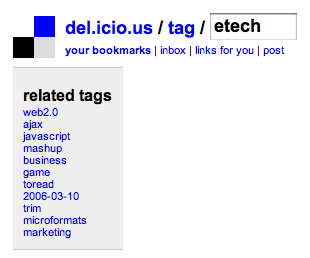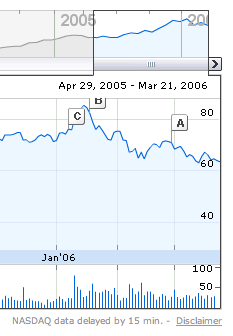tecznotes
Michal Migurski's notebook, listening post, and soapbox. Subscribe to ![]() this blog.
Check out the rest of my site as well.
this blog.
Check out the rest of my site as well.
Mar 31, 2006 12:24am
chilling effects
Jonah Peretti, interviewed by Stay Free:
STAY FREE!: The one site from your students that sticks with me most is WhatIsVictoriasSecret.com.PERETTI: Yeah, it's number two when you search for Victoria's Secret on Google.
SF!: I love that Victoria's Secret couldn't go after them.
P: But they did—
SF!: The lawyer told them to take down the direct links to the real Victoria's Secret site to make sure they didn't confuse users, right?
P: Yes, but initially they called and said to take the site down immediately. A guy who worked on the site got the call and took it down, but the women working with him put it back up. The Victoria's Secret lawyer called back begging, "Could you go after Calvin Klein or Frederick's of Hollywood instead?" But when they asked the lawyer to send a cease-and-desist, she refused to put anything in writing: "I don't want that showing up on the web." She didn't want the story to be about Victoria's Secret trying to shut down a site that girls created about body image. The site had already gotten some press and they didn't want it to get more.
Who's feeling the chilling effect now?
Mar 28, 2006 6:58am
lem
KRAKOW, Poland - Polish author Stanislaw Lem, one of the world's leading science-fiction writers, died on Monday in his home city of Krakow at the age of 84 after a battle with heart disease. (Yahoo)
Recommended reading:
- Solaris
- The Futurological Congress
- The Cyberiad
- Tales Of Pirx The Pilot
- Imaginary Magnitude
- Memoirs Found In A Bathtub
Not by Lem, but highly praised by Lem:
Mar 25, 2006 8:49am
go big
"It's a bad time to start a company" (Caterina Fake)
I've just arrived in Vancouver for the IA Summit, where I will be on a Sunday panel with Gene Smith, Dan Brown, and Michal Arrington (I will be the one running back and forth along the net, picking up wayward tennis balls). The topic of our conversation is Web 2.0, and what it means for information architects. This comes somewhat hot-on-the-heels of Peter Merholz calling out Web 2.0 poster-company 37Signals for their "shallow views and rhetoric", in response to a swipe at information architecture from the Getting Real PDF file, and I have been informed that a lot of information architects are worried about what Web 2.0 means for their employability. What skills will transfer, does user-created content mean no one needs to be told how to choose section titles, etc.
Caterina Fake's post detailing the reasons why it's a shitty time to start a new venture (everyone else is doing it, talent pool is finite) is a ray of hope for me, because one of the defining characteristics of Web 2.0 for me personally has been "Low Hanging Fruit". There are a million companies with similar-sounding names and logos all running a mile-a-minute trying to solve easy problems: calendars, word processing, drag and drop, time-and-milestone trackers. Web frameworks Rails, Django, and TurboGears are optimized for these tasks, and process dogma Getting Real assumes that anything which takes more than a week to dream up, prototype, and release may very well not be worth doing.
If all the coders and designers are exhausting themselves implementing known solutions to solved problems, who's paying attention to the big questions? This feels like the natural home for the IA Summit crowd: people comfortable imposing order on chaos and tackling big tasks. I say this more from a position of reverence than experience, because I'm definitely missing the experience of long-term, many-faceted projects at the moment. There's so much fast-turnaround, race-to-market work in the world right now it's making my head spin, and not in a good way.
It's an auspicious time to Go Big.
Mar 21, 2006 6:16pm
google finance
So it's been a while since I've gushed about something here, especially something from Google. Today's release of Google Finance is pretty damn cool, though. Not being a money guy, I can't speak to the accuracy or value of the information below the fold, but the chart and news panes at the top of each page are stunning.
Few things I'm noticing in my first ten minutes:
- News integration is cool. First thing I find myself doing when viewing any sort of time-series is attaching meaning to events. A good example of this is the famous George Bush ratings chart pegged to terror alerts, showing sharp upticks as a result of / caused by DHS terror alerts. Google has pulled in their News database to connect stories to price events. It's not clear to me whether they're searching for stories on days with higher-than-average price velocity (the msft charts seems to support this) or attaching the most written-about or linked-to stories without regrad to stock activity. The latter feels more intuitively interesting to me, since it opens the possibility that snowballing stories which take days or weeks to reach momentum would be represented, even if they don't cause sharp, obvious price discontinuities.
- The graph is fantastic. Speedy, implemented in Flash, granular, informative. It's easy to choose your time window, and they offer two separate views of price information. One is a low-detail five-year history, the other is a high-detail specific timeframe history with trading volume below.
- The current value is big and bold. It should be obvious from the style I've chosen for post dates on this site that I'm a fan of big, bold, short values set in Helvetica. Google's font for Finance is Arial, Helvetica and, and they made the current price big. And bold.
- In spite of all this, Yahoo!'s much older Finance application offers quite a bit more detail on their stock pages. Although Yahoo! doesn't use .swf or javascript much, the forced page reload means that at any point a user can copy the contents of the browser location bar and send the exact graph they're looking at to someone else. This is a big deal, and it's surprising to see that the older applications are the ones that respect REST more. It's the reason I often go back to Yahoo! Maps in favor of Google or Yahoo! new Goog-alike map.
- No comparisons? Lame.
There's room for improvement, but those charts are insanely great.
Mar 17, 2006 12:46am
reblog screencasted
We've been meaning to do a screencast of Reblog for some time, but haven't gotten around to it. Today, Matt Haughey beat us to the punch with a Lifehacker article detailing Reblog's installation and use. Matt provides a quick overview of the minimal steps required to get Reblog up and running on your own server, and details on how he uses his own copy in accordance with the gospel of GTD.
It's great to see Reblog getting a bit of attention, hopefully we'll see a wider install base to counteract the accumulation of centralized RSS services like Bloglines or Google Reader. Since absorbing some of the Google-Bad mojo from Root, I've come to believe that distributed installations of such information routing and aggregating programs on individually-controlled servers are needed to counteract the flood of software-as-a-service products which trade convenience for privacy, or worse.
Mar 10, 2006 9:04pm
emerging technologies 2006
I'd say this about sums it up:

Happy:
- Cal's Flickr rundown.
- Ben and Matt's session on playsh.
- Jo's session on conference hacking - turns out it's just like planning a rave.
- Escaping on Wednesday with Mike, Seth and Jonas to get a tour of the Salk Institute in La Jolla.
- Loafing about on the hotel floor with geo-positive geeks.
Unhappy:
- Zimbra's advertainment.
- Everything Technorati touches.
- Too many people, too many concurrent sessions.
- Spotty wi-fi.
Mar 2, 2006 5:48pm
late to the party
I started using del.icio.us this week.
Well, not really. I've had an account since summer '04, but I've never used it for much besides testing API features. Before hearing about Del.icio.us, I rolled my own database of text and URL snippets and experimented with various ways of pushing content in: via bookmarklets, e-mail, drag and drop to "hot" folders on my desktop, and so on. I have high personal inertia so this simple, personal database is still in use running my snippets feed.
However, Reblog 2.0 now supports Del-like posting bookmarklets, republishing items from RSS feeds, and plug-ins. I modified the snippets database to accept input directly from a Reblog plug-in, and activated Reblog's Delicious_Post plug-in as well. Now, the public output of my attention span can be seen in three different places:
- Tecznotes snippets, with swanky looking posting activity chart. (RSS)
- Del.icio.us migurski, with social view of links I find interesting and antihelpfully-truncated descriptions. I don't use tags, sorry. (RSS)
- My Reblog, with attributions and OPML. This is technically the horse's mouth. (RSS, Atom)
This kind of link foraging and rebroadcasting is what Mike and I will be talking about next week at E-Tech. If you're there, please attend our wonderful session Thursday morning.
